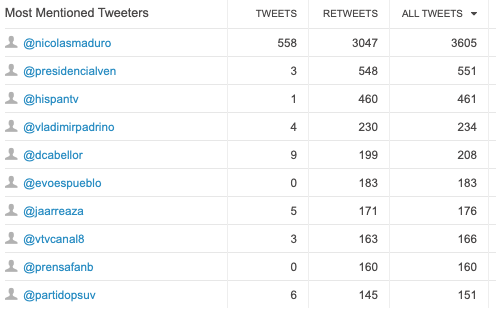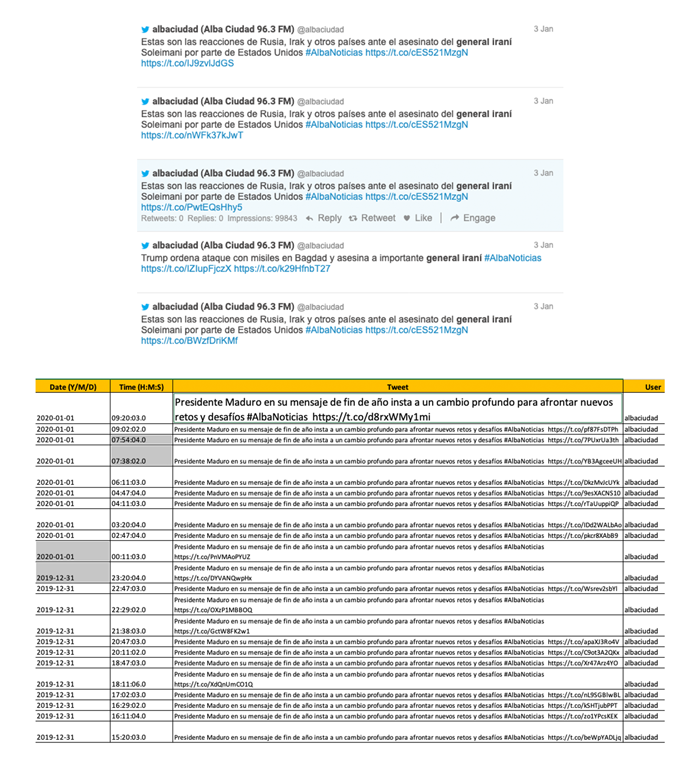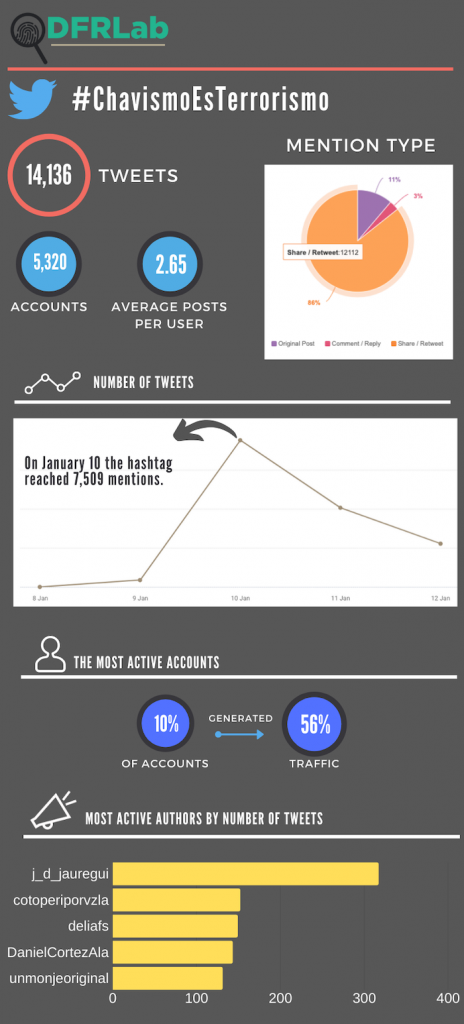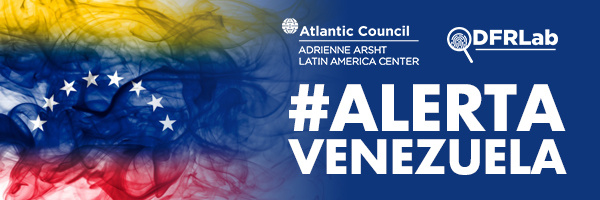#AlertaVenezuela is leading the way in identifying, exposing, and explaining disinformation within the context of one of the Western Hemisphere’s largest crises in recent history, where the fight for control of the information space will continue to pose a challenge for the region.
TOP STORY: What we know about the pro-Maduro accounts suspended on Twitter
Twitter suspended dozens of accounts connected to the Maduro regime on January 7, 2020, including the official accounts of the Ministerio del Poder Popular de Petróleo (the Ministry of People’s Power for Petroleum), the Minister of the Interior, the Central Bank of Venezuela, and the Bolivarian Army of Venezuela. The company did not publish official information about the number of accounts involved in – or the rationale for – the suspension. Typically, a Twitter account is suspended if it violates Twitter’s user policies and guidelines that ban behaviors such as spam and platform manipulation.
The Maduro regime has a history of using Twitter to manipulate information. The most notorious case of Twitter manipulation in Venezuela involved the Ministry of the Interior in 2017, which created a manual to fight an alleged “media war” with an army of trolls. Venezuela is one of the few countries where Twitter has suspended accounts involved in information operations.
The accounts that were taken down on January 7 belonged to individuals and organizations connected to the Maduro regime, such as ministries, security forces, political pro-Maduro movements, media outlets, high-ranking officials, and regime supporters. According to media articles and Madurista Twitter accounts, 43 pro-regime accounts were suspended by Twitter. By January 13, seven of these accounts were back online.
One of the suspended accounts, belonging to the Ministry of People’s Power for Petroleum account (@minpetroleove), was previously blocked in 2019. The account of Diosdado Cabello’s daughter, @danicabello11, was the only account belonging to relatives of officials that was identified in the list of accounts suspended.
The DFRLab collected 16,099 tweets (original posts, retweets, replies) published by the suspended accounts from December 1, 2019, to January 11, 2020, using social media listening tool Brandwatch. While the suspension happened on January 7, some accounts were back online over the following days, thus the analysis window extended to January 11. According to a Brandwatch readout, the last tweet from the suspended accounts on January 7 was published at 7:30 p.m. UTC.
A common characteristic exhibited by the accounts was a tendency to retweet Nicolás Maduro’s official account. Amplifying Maduro’s content cannot alone be pinpointed as the main cause of the suspension, however, as only Twitter is in the position to affirm the specific reasons for the takedown.
Maduro was mentioned — either in tagging his account or mentioning his name — 3,965 times (26 percent of the total tweets analyzed) by the suspended accounts. The most used words that appeared on the posts taken from Maduro’s account were “patria” (“motherland”) and “pueblo” (“nation”), and the most common phrases mentioned on the posts were “pueblo venezolano” (“Venezuelan people”).

Two accounts that were taken down, @Albaciudad and @MinEcoFinanzas, showed a high frequency of activity, a mix of original tweets alongside duplicative or repeated content that used identical language. Twitter’s platform manipulation and spam policy notes that “posting and deleting the same content repeatedly; (…) repeatedly posting identical or nearly identical tweets” are a misuse of the platform. @Albaciudad and @MinEcoFinanzas are both back online.
The Ministerio del Poder Popular de Economía y Finanzas’s (Ministry of People’s Power of Economy and Finance) official Twitter account (@MinEcoFinanzas) featured the highest volume of tweets that used the exact same language but posted anew. Tweets promoting the rational use of energy as a measure against power outages (37 posts repeated), announcing procedures for pensioners (31), or inviting users to follow the Ministry (22) were published on a daily basis from December 1 to January 11. It is possible that Twitter does not consider this behavior spam, since Twitter has not publicly established a maximum amount of duplicative posts that would result in suspension. Until January 7, @MinEcoFinanzas tweeted 1,121 times. Four hundred fifty-one (40 percent) of the total tweets were retweets and 670 (60 percent) were original posts. This account is also now back online.
On the other hand, @Albaciudad registered the highest number of identical-language tweets per day: 22 between December 31 and January 1 (11 per day). This account shows features of automation in other messages promoting radio station playlists and songs, as its role as a radio station includes promotion of this kind of content.
This account also used automation with repeated content supporting Maduro or sharing links about the death of Qasem Soleimani, major general of Iran’s Islamic Revolutionary Guard Corps (IRGC).

TALK OF THE COUNTRY: In the Media
“Miles de venezolanos regresan a Colombia luego de las fiestas de fin de año” (“Thousands of Venezuelans return to Colombia after the holidays”), published byRCN Radio on January 10, 2020, shared statistics about the number of Venezuelans returning to Colombia in the first days of January 2020. The article was shared roughly 16,607 times on Facebook and garnered 118,416 interactions according to CrowdTangle, including shares, comments, and reactions across all public and private posts on Facebook. In total, posts referencing the article received 104,800 engagements on Facebook and Twitter combined, based on a BuzzSumo analysis. According to Migración Colombia (Colombia Migration), a part of the country’s Ministry of External Relations, since January 7, more than 200,000 Venezuelans have crossed the border into Colombia. Many of the migrants are refugees in search of badly needed food and medicine, among other basic needs, as a result of the dire economic, political, and humanitarian crisis in Venezuela.
In the national press, the article that garnered the most engagement on social media was “#VivateleSUR: Defienden a multiestatal ante amenazas de Guaidó” (“#VivateleSUR: defend the multi-state run network from Guaidó’s threats”) published by Telesur on January 13, 2020. The article garnered 2,818 interactions, including reactions, shares, and comments. In total, the piece was shared 496 times on Facebook and received 2,800 engagements on Facebook and Twitter combined. The piece shared posts from Twitter accounts defending Telesur after the Juan Guaidó posted a Twitter thread (archive) charging, in part, that “[s]ince its creation, Telesurhas been used to promote destabilization in the region, support terrorist groups, attack democracy, lie about Venezuela, and defend the dictatorship of Maduro.” Among the accounts supporting Telesur were Evo Morales, former President of Bolivia; Diosdado Cabello, president of the pro-Maduro Constituent National Assembly and Maduro’s second-in-command; and Piedad Córdoba, a Colombian politician who served as Senator from 1994 to 2010.
TALK OF THE COUNTRY: On Social Media
#ChavismoEsTerrorismo (“Chavismo is terrorism”)
After the death of Qasem Soleimani, Iran’s relationship with the Maduro regime has been discussed in the media. On Twitter, the hashtag #ChavismoEsTerrorismo (“Chavismo is terrorism”) appeared on January 9 as an additional issue being debated regarding the connection between Venezuela and Iran.
One of the most active accounts was @Fundador_iF, with 95 uses of the hashtag. The account posted a thread that included its intention to maintain this hashtag as a trend alongside mentions of terrorist organizations such as Hamas, Hezbollah, and Colombian guerrilla dissent organization FARC, a splinter group from the political party by the same name. The initial post in the thread garnered 109 retweets and 80 likes. This account described its operator as libertarian and as founder of Magazine IF (@Revista_iF), the most mentioned account along the hashtag in 1,336 tweets (9.5 percent of the total posts).
The hashtag #ChavismoEsTerrorismo reached the trending topics between January 10 and January 12. On the first day, the account garnered its highest number of posts: 7,509.

OFFICIAL STATEMENTS
“We’ll see what happens with Venezuela. They’re doing poorly. I mean, there’s a great case — when I say this country will never be a socialist nation, there’s a great case. It was a wealthy country 15 years ago, 20 years ago. That was like, a really wealthy country. And now they don’t have water. They don’t have food. We’re supplying a lot of food. We’re supplying a lot of water.” — Donald Trump, president of the United States, during a press conference on January 9. In response to a follow-up question asking about changing his administration’s approach to Venezuela, Trump replied, “They have a system that, right now, is very broken. We’ll see what happens. Stay tuned.”
Hago pública la misiva enviada al Gral. @vladimirpadrino C/C a los comandantes de cada componente, dejando constancia de la convocatoria de la sesión este #15Ene en el Palacio Federal Legislativo. Es el pueblo con su voto y la constitución quien decide quién entra al parlamento.
“I am making public this letter to General @vladimirpadrino cc’ing the commanders of each branch, offering proof of the convening set to be held this #15Jan in the National Assembly Palace. It is the Venezuelan people, with their vote, and the Constitution that decide who enters parliament.” — Juan Guaidó, President of the National Assembly of Venezuela who is recognized by more than 50 countries as interim president of the country, announcing on Twitter (archive) that he will preside over the first session as reelected president of the National Assembly on Wednesday, January 15. This statement took place after the Maduro regime forcibly blocked Assembly members from entering the building on January 5.
OUR TEAM IN THE NEWS
Voice of America’s Spanish news service covered the Atlantic Council event on stemming illicit activities in Venezuela. The article included coverage of Diego Area’s comments on disinformation in Latin America. Area’s comments at the January 9 public event were also covered in real time by Venezuelan Journalist and influencer Carla Angola, who streamed her coverage on Instagram stories to her 2.1 million followers.
Dialogo Americas covered the Atlantic Council’s analysis of the activity online around the Chilean protests, published in late 2019.
RECENT ANALYSES
“Network of pro-Maduro Twitter accounts pushed anti-Guaidó hashtags,” published by the DFRLab on January 14, discussed a coordinated campaign to get hashtags targeting Guaidó into the trending topics on Twitter.
Diego Area, associate director at the Adrienne Arsht Latin America Center, discussed disinformation in the context of Venezuela at a January 9 event focused on stemming Maduro’s illicit activities following the January 5 National Assembly elections.
Following the January 5 election in Venezuela, Jason Marczak, director of the Adrienne Arsht Latin America Center, and Diego Area, provided insight for a Q&A on the New Atlanticist about the day’s events.
Subscribe to the #AlertaVenezuela newsletter
To receive future editions of the #AlertaVenezuela newsletter each week, sign up below!
